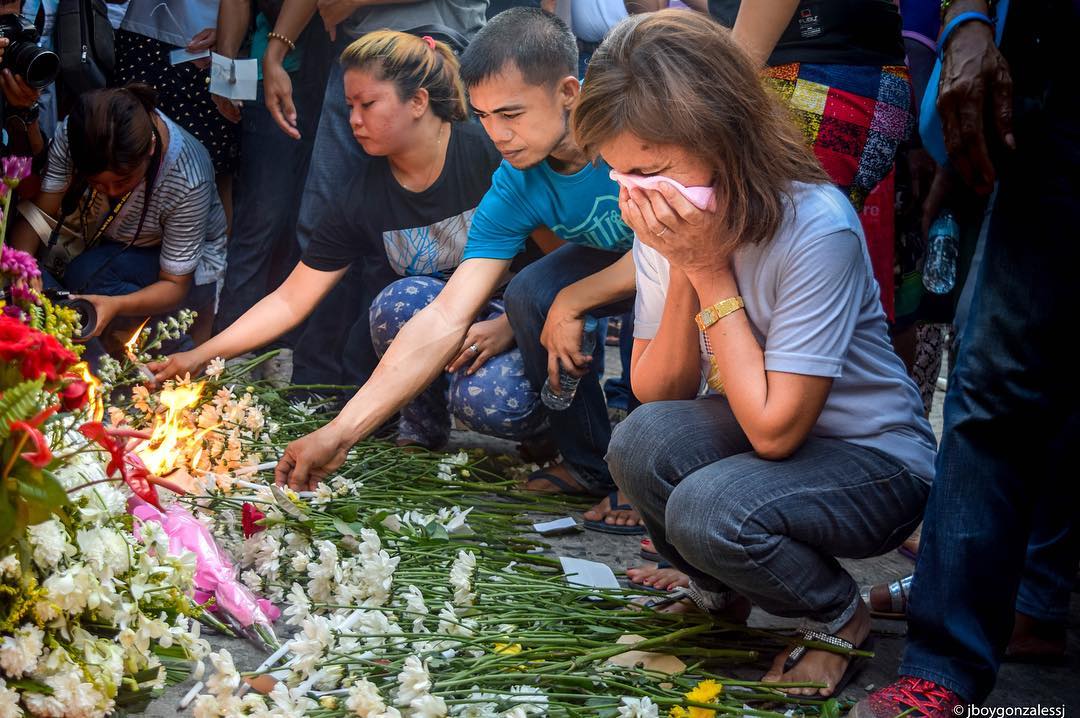AT LEAST 14 people were killed and 71 were injured after a bomb explosion rocked Davao City’s Roxas Night Market last Friday night. The attack prompted President Rodrigo Duterte to declare a nationwide “state of lawless violence” yesterday morning.
A spokesperson for Abu Sayyaf, a terrorist group subject of an ongoing military offensive in Sulu, has pointed to allied group Daulat Ul Islamiya as the perpetrators of the attack. Yet police are still investigating other possible motives apart from terrorism.
The explosion site was along Roxas Avenue, near the Ateneo de Davao University (ADDU). According to ADDU President Joel Tabora, SJ, at least two students were injured in the attack. A campus lockdown was ordered immediately.
Still in shock
ADDU Senior High School Assistant Director for Formation JBoy Gonzales, SJ was able to chronicle the events as they happened through his Twitter account.
In an interview with The GUIDON, Gonzales said that there were many people in the night market since it was a Friday. “The night market opens at around six’o clock. People would go there just to eat barbeque…it’s very very cheap. And then you have massages right where the park is,” he said. Some Davaoeños consider the night market as their “happy place.”
Gonzales was staying at the top floor of a building across the night market when he heard an explosion. “So naririnig ko ‘yung kasayahan [sa labas] tapos may biglang pumutok na ang lakas-lakas. It reverberated throughout the whole building (I was hearing the merry-making outside then suddenly, there was a loud explosion. It reverberated throughout the whole building),” he said.
Some ADDU students remain “shocked and scared,” according to Coalition of Ateneans for Indigenous Peoples head Dane Ancheta (5 BS Applied Physics), who was able to talk with some of her contacts within the university.
“Many students go there [in the night market] and [it was a] bloody scene talaga,” Ancheta said.
The city remains tense as rumors of another bombing have been circulating through text messages. “The people, are more or less, they don’t go to crowded areas kasi ang daming threats eh…So more or less, people are afraid, people are a bit wary to go [out],” Gonzales said.
Aiza Enlope, an education junior from ADDU, told Ancheta that there were already some bomb threats going around before the attack.
Rising up
Despite this, Davao City Mayor Sara Duterte said in statement that Davao “will not be terrorized by this heinous crime.”
“I call on all Dabawenyos to unite and let us help each other rise from this senseless incident,” she said. As a sign of resilience, Mayor Duterte announced that the Roxas night market will remain open.
To honor the victims of the tragedy, Davao Archbishop Romulo Valles presided over a memorial Mass near the blast site yesterday afternoon. People also lit candles and laid flowers at the area.
Meanwhile, the Ateneo de Manila’s Sanggunian has released a statement expressing solidarity with the people of Davao City.
“We condemn any act of senseless violence that leads the loss of innocent human life. Our thoughts and prayers are with those affected by the bombing at Roxas Night Market,” a part of the statement read.
The Sanggunian will also lead a prayer vigil on Monday at 4:00 PM, to be followed by a Mass at the Church of the Gesu at 4:45 PM, according to Sanggunian Coordinator Carmela Vinzon.
Full alert
Because of the president’s declaration, law enforcement officials around the country are now on high alert. Philippine National Police Chief Ronaldo “Bato” dela Rosa urged Filipinos to “remain calm and vigilant” and report any suspicious activity to authorities.
According to presidential spokesperson Ernie Abella, the Constitution gives the president the authority to “call out the armed forces to suppress the lawless violence” under Article VII, Section 18 of the 1987 Constitution.
In a Facebook post, presidential peace adviser Sec. Jesus Dureza said that the declaration “merely calls out the military or the AFP to do law enforcement operations normally done only by the PNP.” He also said that the declaration “does not suspend some rights.”
A Newsbreak article calls the declaration of a “state of lawless violence” as the “mildest” of the three emergency powers bestowed upon the president as commander-in-chief. (The others are the suspension of the writ of habeas corpus and the declaration of martial law.)
“What it simply means, he [Duterte] said, is that more soldiers and policemen will now be deployed, government will set up more checkpoints, and impose, if needed, curfews in certain areas,” the article said.
A similar declaration was last made in 2003, when former president Gloria Macapagal-Arroyo declared a “state of lawless violence” in Davao City after a series of explosions hit the city a few days before her visit.




